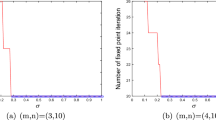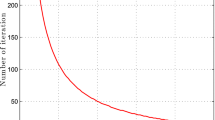Abstract
In this paper, we develop two kinds of the projected iterative methods for the tensor complementarity problem combining two different splitting frameworks. The first method is on the basis of tensor splitting, and its monotone convergence is proved based on the \({\mathcal{L}}\)-tensor and the strongly monotone tensor. Meanwhile, an alternative method is in the light of majorization matrix splitting, the convergence of which is given and is particularly analyzed based on the power Lipschitz tensor. Some numerical examples are tested to illustrate the proposed methods.


Similar content being viewed by others
References
Song, Y., Qi, L.: Properties of tensor complementarity problem and some classes of structured tensors. Ann. Appl. Math. 33(3), 308–323 (2017)
Wang, X., Che, M., Wei, Y.: Randomized Kaczmarz methods for tensor complementarity problems. Comput. Optim. Appl. 82(3), 595–615 (2022)
Wang, X., Che, M., Qi, L., Wei, Y.: Modified gradient dynamic approach to the tensor complementarity problem. Optim. Methods Softw. 35(2), 394–415 (2020)
Qi, L., Huang, Z.-H.: Tensor complementarity problems-part II: solution methods. J. Optim. Theory Appl. 183(2), 365–385 (2019)
Huang, Z.-H., Li, Y.-F., Miao, X.: Finding the least element of a nonnegative solution set of a class of polynomial inequalities. SIAM J. Matrix Anal. Appl. 44(2), 530–558 (2023)
Dai, P.-F.: A fixed point iterative method for tensor complementarity problems. J. Sci. Comput. 84(3), 49 (2020)
Huang, Z.-H., Li, Y.-F., Wang, Y.: A fixed point iterative method for tensor complementarity problems with the implicit Z-tensors. J. Glob. Optim. 86(2), 495–520 (2023)
Wang, X., Wei, P., Wei, Y.: A fixed point iterative method for third-order tensor linear complementarity problems. J. Optim. Theory Appl. 197(1), 334–357 (2023)
Cottle, R.W., Pang, J.S., Stone, R.E.: The Linear Complementarity Problem. Academic Press, New York (1992)
Dehghan, M., Hajarian, M.: Improving preconditioned SOR-type iterative methods for L-matrices. Int. J. Numer. Methods Biomed. Eng. 27(5), 774–784 (2011)
Mangasarian, O.L.: Solution of symmetric linear complementarity problems by iterative methods. J. Optim. Theory Appl. 22(4), 465–485 (1977)
Ahn, B.H.: Solution of nonsymmetric linear complementarity problems by iterative methods. J. Optim. Theory Appl. 33(2), 175–185 (1981)
Dehghan, M., Hajarian, M.: Convergence of SSOR methods for linear complementarity problems. Oper. Res. Lett. 37(3), 219–223 (2009)
Li, Y., Dai, P.: Generalized AOR methods for linear complementarity problem. Appl. Math. Comput. 188(1), 7–18 (2007)
Björck, Å.: Numerical Methods in Matrix Computations. Springer, Berlin (2015)
Adi, B.I., Thomas, N.E.G.: Generalized Inverses: Theory and Applications, 2nd edn. Springer, Berlin (2003)
Wang, X., Che, M., Mo, C., Wei, Y.: Solving the system of nonsingular tensor equations via randomized Kaczmarz-like method. J. Comput. Appl. Math. 421, 114856 (2023)
Xie, S.-L., Li, D.-H., Xu, H.-R.: An iterative method for finding the least solution to the tensor complementarity problem. J. Optim. Theory Appl. 175, 119–136 (2017)
Bu, C., Zhang, X., Zhou, J., Wang, W., Wei, Y.: The inverse, rank and product of tensors. Linear Algebra Appl. 446, 269–280 (2014)
Liu, D., Li, W., Vong, S.-W.: The tensor splitting with application to solve multi-linear systems. J. Comput. Appl. Math. 330, 75–94 (2018)
Author information
Authors and Affiliations
Corresponding author
Additional information
Publisher's Note
Springer Nature remains neutral with regard to jurisdictional claims in published maps and institutional affiliations.
Rights and permissions
Springer Nature or its licensor (e.g. a society or other partner) holds exclusive rights to this article under a publishing agreement with the author(s) or other rightsholder(s); author self-archiving of the accepted manuscript version of this article is solely governed by the terms of such publishing agreement and applicable law.
About this article
Cite this article
Fan, M., Li, J. The projected splitting iterative methods based on tensor splitting and its majorization matrix splitting for the tensor complementarity problem. Optim Lett (2024). https://doi.org/10.1007/s11590-024-02104-1
Received:
Accepted:
Published:
DOI: https://doi.org/10.1007/s11590-024-02104-1




